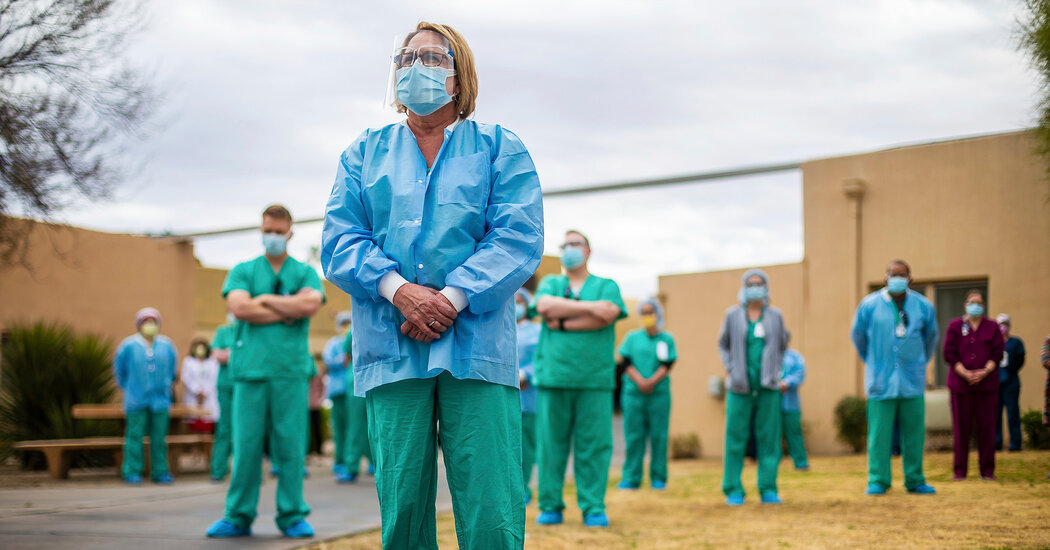Covid-19, Testing and Mask Mandate News: Live Updates – The New York Times

Credit…Etienne Laurent/EPA, via Shutterstock
The extremely contagious Omicron variant is fueling an enormous coronavirus wave that is pushing hospitals close to their capacity limits in about two dozen states, according to data posted by the U.S. Department of Health and Human Services.
At least 80 percent of staffed hospital beds were occupied in 24 states on Thursday, including Georgia, Maryland and Massachusetts, the figures show.
More troubling, the data showed that in 18 states and Washington, D.C., at least 85 percent of beds in adult intensive care units were full, with the most acute scarcity of beds in Alabama, Missouri, New Mexico, Rhode Island and Texas.
The pressure on I.C.U. capacity comes as the Omicron variant has touched off a nearly vertical rise in infections and hospitalizations. The country as a whole and 26 states have reported more coronavirus cases in the past week than in any other seven-day period.
Source: U.S. Department of Health and Human Services. The seven-day average is the average of a day and the previous six days of data. Currently hospitalized is the most recent number of patients with Covid-19 reported by hospitals in the state for the four days prior. Dips and spikes could be due to inconsistent reporting by hospitals. Hospitalization numbers early in the pandemic are undercounts due to incomplete reporting by hospitals to the federal government.
∙ Holiday interruptions to testing and data reporting may affect case and death trends.
In that time, an average of more than 803,000 coronavirus cases have been reported each day in the United States, an increase of 133 percent from two weeks ago, according to a New York Times database, and 25 states and territories have reported their highest weekly caseloads yet. Deaths are up 53 percent to an average of roughly 1,871 a day.
That has helped push the country’s average rate of hospitalizations above last winter’s peak. Hospitalizations of people testing positive for coronavirus over that week are up to more than 148,000 a day, a record. The numbers are rising fastest in Alabama, Florida, Louisiana, Puerto Rico and the U.S. Virgin Islands, according to the Times database.
(The hospitalization figures include people who test positive for the virus after being admitted for conditions unrelated to Covid-19, but there is no national data showing how many people are in that category.)
Since Thanksgiving, the White House has sent more than 350 military doctors, nurses, medics and other personnel to 24 states to help hospitals with staffing challenges, President Biden said this week, and plans to send an additional 1,000 service members to six hard-hit states. That is in addition to the more than 14,000 National Guard members deployed in 49 states to help staff hospitals and other medical facilities, he and other officials said.
On Wednesday, Gov. Tim Walz of Minnesota said the state would spend $40 million in federal funds to hire more staff to help hospitals there for the next 60 days because “we know we’re going to continue to see a sharp rise in cases from the Omicron variant.” Minnesota’s hospitals have been struggling to keep up since the fall, when the National Guard was called in to help with a flood of patients infected by the deadlier Delta variant.
Also Wednesday, Gov. Kate Brown of Oregon said she was sending an additional 700 members of the state’s National Guard — bringing the total deployed to 1,200 members — to help hospitals deal with a rise in coronavirus patients. “Our hospitals are under extreme pressure,” she wrote on Twitter.
Our hospitals are under extreme pressure. Fueled by the Omicron variant, current hospitalizations are over 700 and daily COVID-19 case counts are alarmingly high. To assist, I am deploying 700 additional @oregonguard members—for a total of more than 1,200—to Oregon hospitals.
— Governor Kate Brown (@OregonGovBrown) January 12, 2022
One day earlier Gov. Janet Mills of Maine said she was activating 169 members of the National Guard to help with capacity constraints at hospitals, joining more than 200 members already deployed in the state.
“I wish we did not have to take this step,” Ms. Mills said in a statement, “but the rise in hospitalizations — caused primarily by those who are not vaccinated — is stretching the capacity of our health care system thin, jeopardizing care for Maine people, and putting increased strain on our already exhausted health care workers.”
Azi Paybarah and




